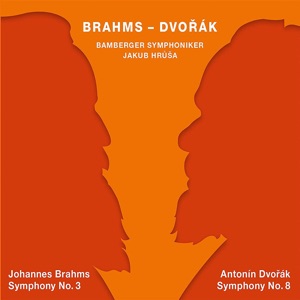In the interview that accompanies this disc, conductor Jakub Hrusa admits that he prefers works that do not conclude with a “superficially effective ending,” whatever that may be. It’s a silly comment for any number of reasons, but perhaps it explains why this recording of Dvorák’s Eighth goes splendidly for the first three movements, and then turns sluggish and dull in the theoretically madcap finale. Granted, there’s a venerable Czech tradition of playing the scherzo-like variations at a moderate tempo, but there’s no excuse for making the kind of wet noodle out of the music’s closing pages that Hrusa does here. In a work that has been recorded so many times, this performance doesn’t compete, and it’s a pity because based on those prior movements it easily could have.
The Brahms Third, which certainly does NOT have a “superficially effective ending,” goes better. Hrusa’s is a lyrical performance, and many listeners might prefer a first movement with more muscle, but the music flows as it should, and Hrusa brings out many lovely details buried in Brahms’ occasionally thick scoring. The Bamberg woodwind players do an especially fine job here. The two inner movements, which show Brahms at his most Dvorák-ish, are just gorgeous, and the finale has plenty of energy and power at the start, leading to a very convincing, elegiac close. True, this isn’t a cosmic vision of the piece in the style of, say, Furtwängler, but it’s quite effective all the same, and of course much better played.
Now for some housekeeping. The engineering is warm and well balanced, but just a bit lacking in openness on top. There’s no reason to spread these two symphonies over two discs. They would have easily fit on just one. Also, it would have been more interesting to couple the Brahms Third with Dvorák’s Fifth, which likely served Brahms as a model in so many ways–rhythmic, melodic, and formal. Putting these two particular symphonies together as a single program isn’t a bad idea, but in the event the concept can only be judged a partial success.
































